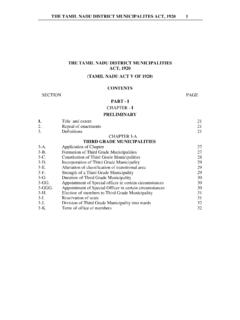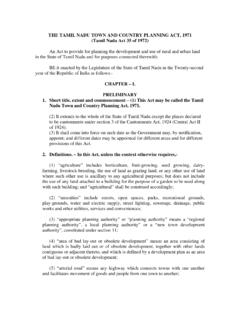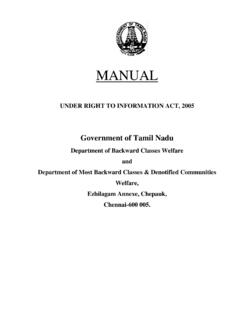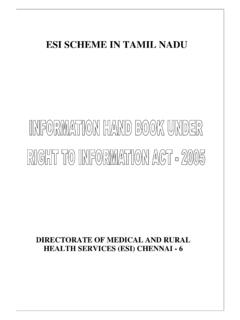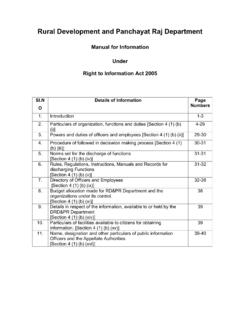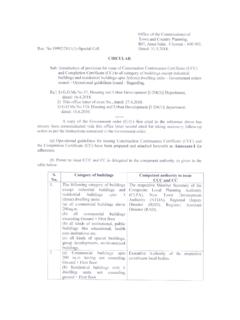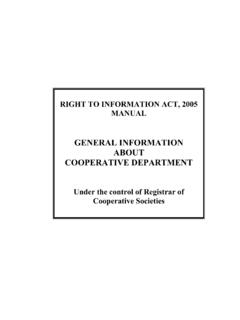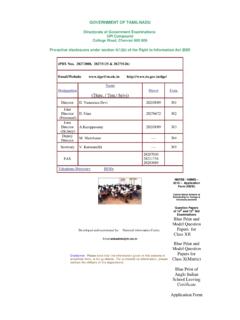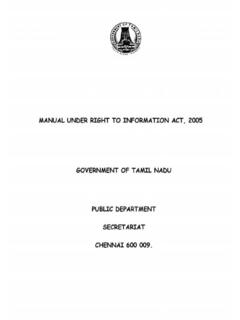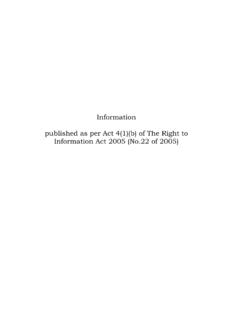Transcription of THE TAMIL NADU APARTMENT OWNERSHIP ACT, 1994
1 THE TAMIL nadu APARTMENT OWNERSHIP ACT, 1994 (Act No. VII of 1995) 6th April, 1995 An Act to provide for the OWNERSHIP of an individual APARTMENT in a building and to make such APARTMENT heritable and transferable immovable property. WHEREAS with a view to securing that the OWNERSHIP and control of the material resources of the community are so distributed as to subserve the common good, it is expedient to provide for the OWNERSHIP of an individual APARTMENT in a building and of an undivided interest in the common areas and facilities appurtenant to such APARTMENT .
2 And to make such APARTMENT and interest heritable and transferable immovable property and to provide for matters connected therewith or incidental thereto; BE it enacted by the Legislative Assembly of the State of TAMIL nadu in the Forty-fifth year of the Republic of India as follows:- CHAPTER I PRELIMINARY 1. Short title, extent and commencement- (1) This Act may be called the TAMIL nadu APARTMENT OWNERSHIP Act, 1994. (2) It extends to the whole of the State of TAMIL nadu . (3) It shall come into force on such date as the Government may, by notification, appoint and different dates may be appointed for different areas.
3 2. Application of this Act - This Act shall apply to every APARTMENT in a building constructed whether before or after the date of commencement of this Act: Provided that such building shall contain five or more apartments or three or more floors and construction of such building has been made in accordance with a planning permit and also a building plan duly sanctioned by the appropriate authority concerned under the relevant law for the time being in force. 3. Definition- In this Act, unless the context otherwise (a) APARTMENT means a part of property intended for any type of independent use including one or more floors or enclosed spaces located in one or more floors (or part or parts thereof)
4 In a building, intended to be used for residence, office, practice of any profession or for carrying on any occupation, trade or business or for other type of independent use and with a direct exit to a public street, road, or highway or to a common area leading to such street, road or highway. Explanation: For the purpose of this clause, an APARTMENT shall be deemed to be intended for independent use notwithstanding that provisions for sanitary, washing, bathing or other conveniences have been made as common for two or more apartments.
5 (b) APARTMENT number means the number, letter, or combination thereof designating the APARTMENT in the Deed of the APARTMENT : (c) APARTMENT owner means the person or persons owning an APARTMENT and an undivided interest in the common areas and facilities or the limited common areas and facilities in the percentage specified in the Deed of APARTMENT and includes an outright purchaser or a hire purchase allottee of such APARTMENT and undivided interest; (d) Association of Apartments owners means all of the apartments owners acting as a group in accordance with the bye-laws.
6 (e) building means a building containing five or more apartments or three or more floors and comprising a part of a property; (f) bye-laws means the bye-laws for the time being in force of the Society or Association of APARTMENT owners and includes an amendment as such bye-laws; (g) committee means the board or the governing body of the society or Association of APARTMENT owners to which the management of its affairs is entrusted: (h) common areas and facilities unless otherwise provided in the Deed of APARTMENT , means- (1) the land on which the building is located.
7 (2) the foundations, columns, girders, beams, supports, main walls, roofs, halls, corridors, lobbies, stairs, stairways, terrace, compound walls, fire escapes, wells, and sumps and entrances and exits of building; (3) the basements, cellars, yards, gardens, parking areas and storage spaces; (4) the premises for lodging of caretakers or persons employed for the maintenance of the property; (5) Water supply, sewerage and drainage connections and the installations of central services such as power, light, gas, hot and cold water, heating, refrigeration, air-conditioning and incinerating; (6) the elevators, tanks, pumps, motors, fans, compressors, ducts and in general all apparatus and installations existing for the common use.
8 (7) automatic fire detecting and alarm facilities necessary to warn the occupants of the property of the existence of the fire; (8) such other community and commercial facilities as may be prescribed; and (9) all other parts of the property necessary or convenient to its existence, maintenance and safety, or normally in common use; (i) common expenses means,- (1) all sums lawfully assessed against the APARTMENT owners by the society or the Association of APARTMENT owners; (2) expenses of administration, maintenance, repair or replacement of the common areas and facilities or the limited common areas and facilities; (3) all legal expenses as may be incurred by the society or the Association of APARTMENT owners for the enforcement of lawful claims of the APARTMENT owners.
9 (4) expenses resolved as common expenses by the society or the Association of APARTMENT owners; and (5) expenses declared as common expenses by the provisions of this Act, or by the bye-laws; (j) common profits means the balance of all income, rents and revenues from the common areas and facilities or the limited common areas and facilities remaining after deduction of the common expenses; (k) competent authority means- (1) in relation to the society registered under the TAMIL nadu Co-operative Societies Act, 1983 ( TAMIL nadu Act 30 of 1983), the Regional Deputy Registrar of Co-operative Societies (Housing) having jurisdiction over the area.
10 Or (2) in relation to the society registered under the TAMIL nadu Societies Registration Act, 1975 ( TAMIL nadu Act 27 of 1975), the Registrar as defined in clause (i) of Section 2 of that Act; (3) in relation to the Association of APARTMENT owners- (a) the Regional Deputy Registrar of Co-operative Societies (Housing) having jurisdiction over the area; or (b) the Registrar as defined in clause (i) of Section 2 of the TAMIL nadu Societies Registration Ac, 1975 ( TAMIL nadu Act 27 of 1975), having jurisdiction over the area.
